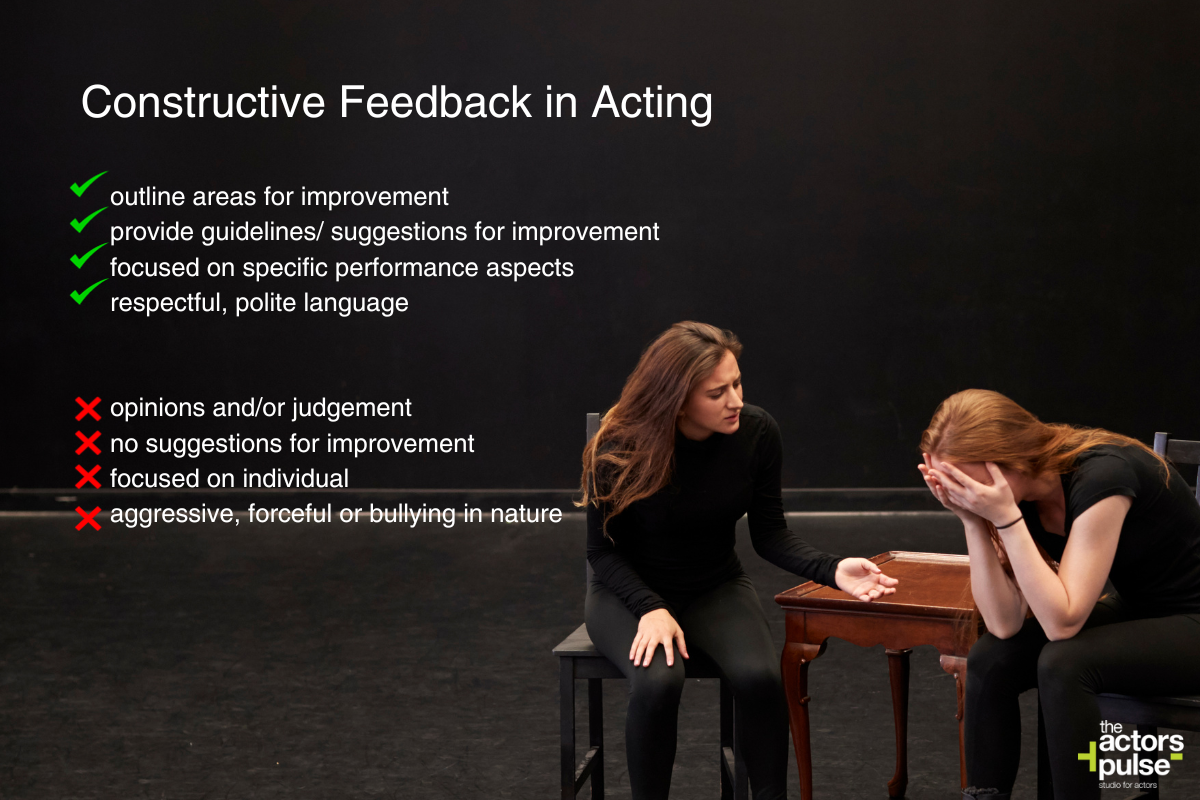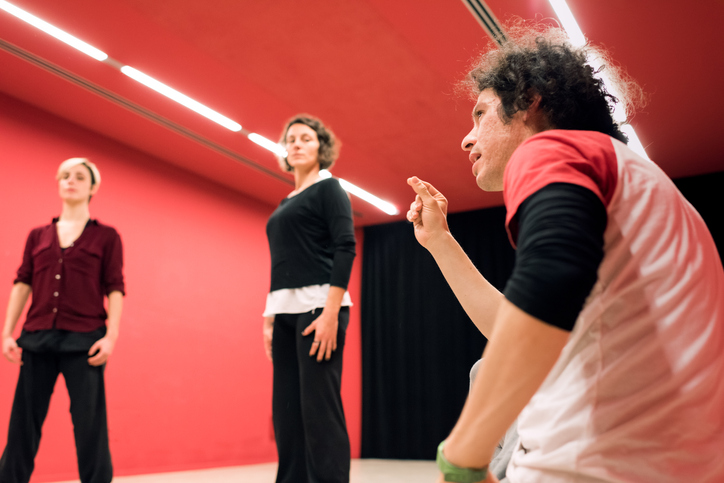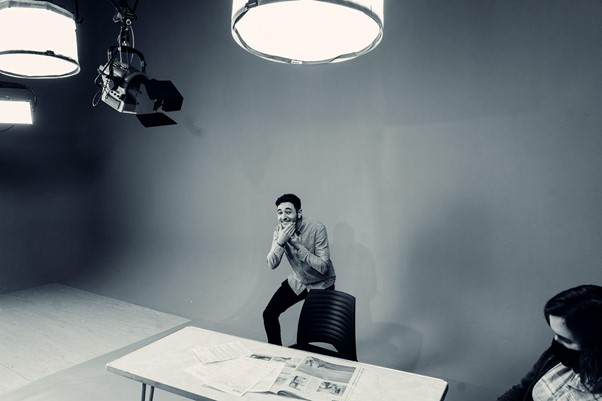The Role Of Feedback And Critiques In Acting Training

No one enjoys being critiqued or receiving feedback on their performance, this is true no matter what field you work in. When it comes to acting, it can feel particularly hard to take.
As acting is inherently a very personal process any perceived negativity, criticism or feedback, even if well-intentioned, has the potential to sting and demotivate.
It is important to note, however, that to become an exceptional actor, learning to receive feedback and take it on board is essential. It may surprise you to learn that we recommend you actively seek feedback as much as possible!
In this guide, we’ll discuss the role of feedback and critiques during acting training, how it should be delivered, why it’s so important and ways to navigate it as an actor.
What Is Feedback In Acting And Why Does It Matter?
Feedback or a critique given during acting training is essentially just a review of a performance by a teacher that outlines where some changes could be made and how to do this.
Not only the opinion of teachers, seasoned actors will also tell you that feedback is a valuable tool and not something to be afraid of or easily upset by.
It is primarily used as an assessment tool and is intended to help guide learning actors to hone their skills. It delivers insights and creates opportunities for guidance, growth and improvement.
Misconceptions Regarding Feedback
There are several misconceptions regarding feedback. That it is purely based on opinion, that it is all bad, and that it is largely unhelpful. In the context of acting training, the leader of these would be that feedback is always bad or negative.
In reality, when properly given, feedback is quite a positive thing.
Serving as a mirror in which your strengths and weaknesses are reflected back at you, it allows you to identify areas for improvement and recognise those in which you excel.
The Importance Of Delivery
Having said this, how feedback is delivered plays a crucial role in how valuable it is and indeed how willingly it is received.
This means it should be constructive in nature, outlining areas for improvement, but giving guidelines on how to achieve this too. This ensures it is helpful and positive rather than purely a judgement based on opinion and is more likely to be taken on board.
Feedback in acting should remain focused on the specifics of a performance, not the individual and only respectful, polite language should be used. It should not be aggressive, forceful, or bullying in nature.
If for any reason during an acting class, you experience feedback that is given contrary to the guidelines above, we recommend speaking with your school regarding this.

How Embracing Feedback Benefits Actors
With the role of feedback being to help you develop into a better actor, here’s what you can expect when you learn to embrace it.
Improved Self-Reflection & Awareness
We’ve said it many times before, being self-aware and able to reflect on your performances critically is vital to becoming a great actor.
Feedback provides an external perspective that ensures we reflect with less bias and more clarity allowing for greater awareness and informed decision making regarding changes.
Greater Skill Development
Feedback is not only around how you deliver your lines, it can also include direction regarding the tone and volume of your voice, body language, emotional expression and character development.
This creates opportunities for more holistic growth and the development of skills across all areas of acting for enhanced performances overall.
Boosted Confidence
Remember, often feedback is a positive thing – it not only outlines areas to improve but highlights what you are great at. Receiving positive feedback builds your confidence and may encourage you to take risks and explore.
Even constructive criticism can be confidence-boosting, it shows how much your teacher cares, that they believe in your potential and that they are invested in your success.
More Effective Communication
Acting at its heart is communication and good communication relies on an honest back and forth. Listening to feedback and understanding where there are gaps in your communication or how you convey emotions is vital to improving your acting.
You can better understand if you are effectively conveying a message or emotion as intended and refine your approach as needed.
Adaptability
Actors who are open to and welcome feedback are amongst the most flexible and adaptable. This makes them better able to adjust their performances for a variety of roles and styles.
This not only makes them highly accomplished and skilled, but more employable too as they can meet the demands of more diverse or challenging roles.
Advanced Collaboration & Teamwork
Collaboration and teamwork are a vital component of acting and encouraging feedback across the board between actors, directors, producers and more fosters a more collaborative team spirit.
Feedback is about learning from one another and valuing the experience or guidance of another. By working together in this way, more cohesive and impactful performances are possible.
Reduced Fear Of Vulnerability
Being an actor means constantly making yourself vulnerable and being open to exploring. When given constructively, feedback helps to create a safe space for this vulnerability.
It provides gentle guidance without discouraging risk-taking or stifling creativity for more genuine, instinctive performances.
Ongoing Professional Growth
If your acting coach wraps you in cotton wool and never gives you feedback, you are going to be ill-prepared for working as an actor.
Learning to receive and work with feedback, both positive and constructive, better prepares you for the rigours of the industry.
You’ll be dealing with feedback of all kinds from casting directors and producers, audiences and more in future, so it is important to learn how to manage this early on.

How To Deal With Feedback As An Actor In Training
No matter how essential feedback is, we get it, sometimes it still really hurts. It is normal to feel frustrated, angry, discouraged or dejected at times when feedback is given.
However, just like rejection is part and parcel of working as an actor, so is feedback.
The following tips can help you navigate the challenges of feedback.
1. Acknowledge The Feedback
Whether you agree or not, your teacher is offering you advice from a place of experience and you are there to learn after all!
Try to keep an open mind and do not let emotions get in the way as this could keep you from learning something invaluable.
2. Listen & Consider
If you find yourself easily overwhelmed or frustrated by feedback, try taking some deep breaths and focusing on listening rather than responding. Remember, feedback given in class is not a personal attack, it is an assessment of skill and intended to guide.
Take the time to consider or reflect on the feedback provided and how this applies to the performance given. Are the suggested changes able to be applied? How might this improve or enhance the performance?
3. Seek Clarification
If you feel confused by the feedback given or haven’t fully understood what was said, it is fine to ask for clarification.
Asking questions of your teachers is expected and encouraged, it demonstrates a willingness to learn, and conveys confidence and respect for yourself, your teacher and your peers.
This can help you better process the feedback by helping you dissect it and work through it on the spot rather than overthinking it later.
4. Be Open To Different Perspectives
The feedback one teacher gives of a performance is likely to be different to that of another teacher watching the same thing.
Does this invalidate the feedback? Not at all, we all perceive things differently and focus on different things as we all have different perspectives and backgrounds.
Accepting that we all have different perspectives can make it easier to deal with feedback, even when negative. It allows us to place ourselves in another’s shoes and think about why they gave the feedback they did.
This supports a more well-rounded and positive approach to digesting and applying feedback. It ensures you are always able to take advantage of any advice given by properly considering it.
5. Show Gratitude
Perhaps one of the most challenging things to do as an actor, showing gratitude in the face of critical feedback is part of being a professional.
This does not mean you have to say thank you, but expressing your appreciation for someone’s time and information shared can go a long way towards a positive learning environment.
Likewise, implementing suggested changes shows that you are committed to growing as an actor and recognise the value of another’s expertise.
Grow Through Feedback With The Actors Pulse
At The Actors Pulse, we take a proactive and positive approach to delivering feedback.
Our classes are designed to uplift and build confidence in our students through consistent feedback that is respectful, constructive and supportive.
Learn how to refine your skills, adjust your performance and prepare for working life as an actor with our feedback and guidance.
Call the Actors Pulse today at 0414 475 515.
Start today!









Contact Us
Get in touch with us using the form or details below. We look forward to hearing from you!









